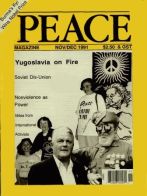
Peace Magazine Nov-Dec 1991, page 5. Some rights reserved.
Search for other articles by Mac Makarchuk here
Search for other articles by Andrew Pakula here
Search for other articles by Janis Alton here
The Canadian Citizens Assembly for the Helsinki Process (CCAHP) met during the International Peace Bureau meeting in Toronto, September 13-15. Several Europeans were present who have been deeply involved in the Helsinki Citizens Assembly and whose differing opinions reflected the current stress within the European organization. There are three contentious areas: a political gulf between the newly-right wing Eastern European and the left-liberal Western Europeans; the civil war in Yugoslavia, about which opinions are predictably polarized; and a difficulty concerning the degree to which the decisions are made at the centre or at the grass-roots. (This last dispute will seem familiar to everyone who knows the history of the Canadian Peace Alliance.) We hope our European friends will come to a meeting of minds soon.
In Canada, CCAHP is beginning to function as a useful networking facility for activists in various movements. Everyone is invited to participate in one or more of the standing commissions by sharing news, ideas, and papers. Commissions will report on the CCAHP page(s) of PEACE.
Commission on Nationalism and (Con)federal Structures
The desire for national self-determination is understandable as a way of getting rid of old totalitarian structures. At the same time, in parts of Eastern and Central Europe, national self-determination resulted in chauvinism, xenophobia, and rampant disregard of the rights of minorities and consequently led to ethnic conflicts and violence. In addition to its enormous human costs, such violence inhibits foreign investment and economic renewal. As the world becomes more and more interdependent, there is greater need for nations and nationalities to work together on improving the quality of life as well as democratic and just society.
Mac Makarchuk and Andrew Pakula
Commission on Human Rights
Bob Torrance represented the Canadian Council of Churches in Moscow at the Conference on Security and Cooperation in Europe (CSCE) this fall. President Gorbachev, who opened the meeting, was greeted with immense enthusiasm. Also present were U.S. Secretary of State James Baker and Canada's Minister of External Affairs, Barbara MacDougall. The main topic was Yugoslavia. The European Community was working to restore peace during much discussion of inviting NATO to take over that responsibility, but many hoped that it might be the CSCE instead. A large obstacle to the latter proposal was the diffidence of Foreign Minister Genscher; while Germany has great influence in both NATO and the CSCE, the history of its involvement in Yugoslavia makes it an unlikely mediator in the present dispute. Although Germany has not ruled out participation, Mr. Genscher would need to be strongly encouraged to agree to it. Some countries that have been prominent members of the "Neutral and Non-aligned Group" may facilitate that move. On the other hand, the United States has a larger role in NATO than in the CSCE and for that reason does not favor an expanding role for the CSCE.
Contact Fergus Watt to join or receive further information about CCAHP and its six commissions: Women, Civil Society and the Democratic Integration of Europe; Demilitarization and Peace Politics; Economy and Ecology; Human Rights; Nationalism and (Con)federal Structures. Secretariat: World Federalists, 207-145 Spruce Street, Ottawa K1R 6P1. Phone 613/232-0647. Fax 613/563-0017.

Peace Magazine Nov-Dec 1991, page 5. Some rights reserved.
Search for other articles by Mac Makarchuk here
Search for other articles by Andrew Pakula here
Search for other articles by Janis Alton here